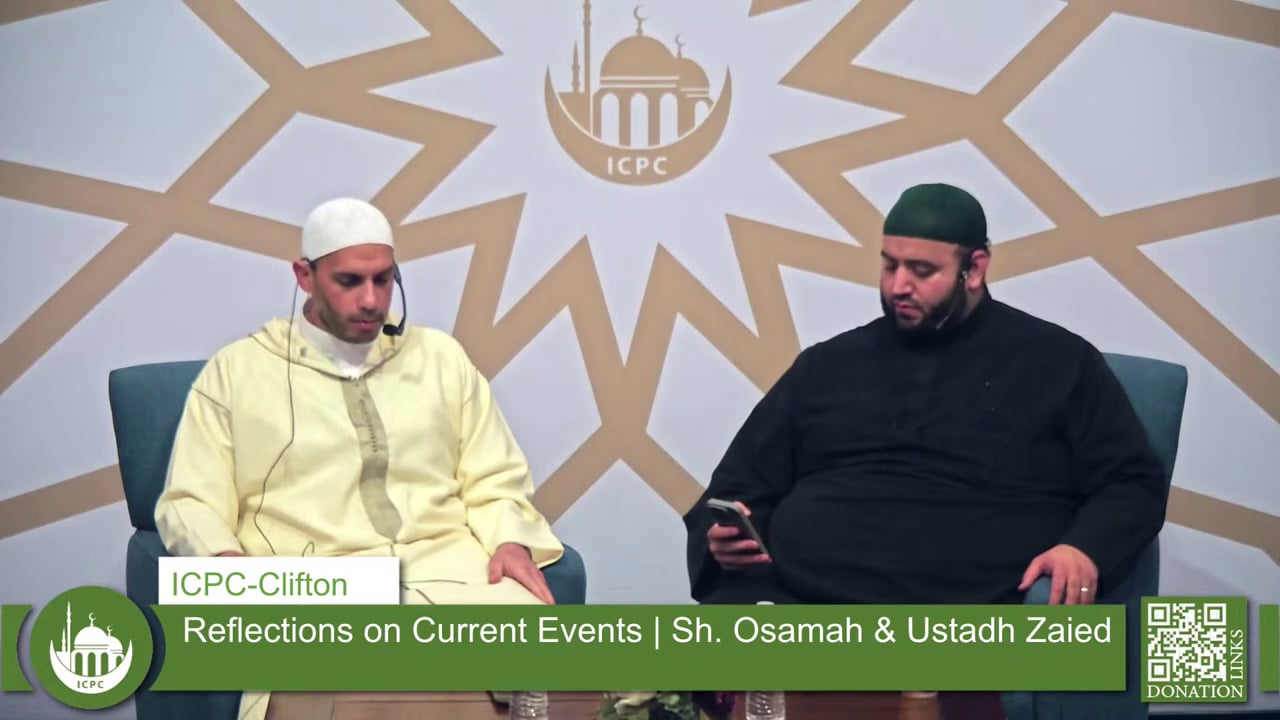
Iraqi researcher Ghaith Al-Tamimi, who is a former Shi'ite cleric, said in a February 9, 2020 interview on Zagros TV (Iraqi Kurdistan) that religion and religious societies justify killing, crime, lying, stealing, and violations of human rights in a fashion that rational deduction has shown to be wrong and that non-religious systems do not tolerate. He said that religion is the only context in which a person who kills another can be a mujahid or in which stealing from people by telling them they will go to Hell if they don't part with their property can be justified as gathering charity. He criticized religious institutions and countries, which he described as "drowning in corruption," and he argued that Shi'ites and Sunnis justify killing each other because of their religious beliefs. Saying that Shi'ites and Sunnis essentially believe in a different Allah, and that even Ayatollah Khamenei and Ayatollah Al-Sistani believe in a different Allah, Al-Tamimi asked who has the right to implement the things that Allah says in the Quran. Furthermore, he criticized religious scholars who "keep Allah in [their] pocket" and keep Him "in the background" in order to exercise personal authority, and he said that religious institutions should reform themselves before trying to reform society.
Ghaith Al-Tamimi: "Religious studies have shown us that religions have justified crime. Religions have justified lying, stealing, and violating the rights of others. Religions do not necessarily always implement justice."
Interviewer: "You're talking about all religions..."
Ghaith Al-Tamimi: "Yes, without exception. Why? Because one of the basic roles of a religion is to accommodate its followers with the absolute truth. Religion makes you feel like you own the truth. Let me give you a small example. When one person kills another, he is a criminal. There is no other definition. Only religions allow you to kill a person and be considered a mujahid. You see what I mean? A person who steals from another is a thief. There is no way around it. Only religions allow you to steal the property of others under pretexts like booty, the khums tax, or zakat [mandatory charity], and other religious classifications, which exist in Christianity and Judaism..."
Interviewer: "The khums is different."
Ghaith Al-Tamimi: "Don't tell me it's different..."
Interviewer: "The khums is different. It's not theft. People pay it of their own free will..."
Ghaith Al-Tamini: "No, no. When you collect the khums, the person isn't giving it out of his free will. You say to that person: 'Give me the khums or you will go to Hell.' So you take it from him against his will. Nobody gives away his money willingly.
[...]
"In many cases, religions have justified things that humanity has concluded through rational deduction to be wrong. Lying is permitted if it is done to support or defend the religion. You may defy your parents under religious pretexts.
[...]
"Usually, societies that are governed by a religious system are replete with violence, crime, racial discrimination, social conflicts, and lack of justice.
[...]
"This is why secular Jews defend the rights of the Palestinians, while religious Jews justify the violation of the rights of the Palestinians. The same story [is true in Iraq]. The Shi'ites in Iraq justify the killing of the Sunnis, the violation of their rights, plundering them, attacking them..."
Interviewer: "These are exceptional cases..."
Ghaith Al-Tamini: "Don't tell me these are exceptional cases. I am talking about a social system of values. They justify this. They think it is justified. There are ideological reasons for this justification. They believe that they are more worthy of ruling and enjoying justice. These are all their privileges. The same is true of the Sunnis. They believe they have Sunni privileges. In Saudi Arabia, for example, they see the Shi'ites as..."
Interviewer: "Why are you talking about Shi'ites and Sunnis? Why not talk about 'extremists' among the Shi'ites and the Sunnis?"
Ghaith Al-Tamini: "I am not talking about individuals, but about a value system. This is why I say that if you take that very same Sunni or that Shi'ite and drop him in Sweden, Germany, or Japan, he would become a just person, since he is not the problem.
[...]
"When you quote a Quranic verse and say: 'Allah says...' Fine. So Allah says something. But who implements it? Khamenei? We've seen his record. He oppresses the Iranian people, and he slaughtered and executed 1,000 people [in November 2019]."
Interviewer: "Don't go into politics..."
Ghaith Al-Tamini: "This isn't politics, it's about human rights."
Interviewer: "Keep our discussion ideological..."
Ghaith Al-Tamini: "[In Iran], there are human rights violations, poverty, hunger, deprivation, and more. Let's move to our experience in Iraq. I'm talking human rights, not politics. If you tell me that the religious system produces a moral society, I will applaud this. I am a Muslim, and I have to believe in what you say. But in practice, the religious society in Iraq, according to our experience in the past and in the present, is a cruel society. The state is extremely cruel. It has no problem oppressing, killing, fabricating, and stealing people's money. The same is true of the religious endowments system. Don't tell me that I am talking politics. The religious endowments system operates according to fatwas. It has a religious cover, but it is one of the most corrupt and thieving organizations of the Iraqi state."
Interviewer: "The religious endowments authority?"
Ghaith Al-Tamini: "Of course. If we look at the school curricula, we see that the religious interference in these curricula has distorted [the minds of] the children. Imagine a child whose mother does not wear a hijab. When he comes to school, they teach him that a woman who does not wear a hijab is lewd. [He is told:] 'Your mother is lewd.' What has happened to our education system?
[...]
"Let me take you to non-religious countries and I'll show you justice, human rights, honesty, and more. These things exist among the people and in the institutions and regime. But if I take you to a religious country, I will show you corruption, deviations, and all the things you are talking about. My colleague said that religious does not justify killing. This is not true! Religion does justify killing. I'll explain, and I ask my colleague to deny it if I say something wrong. According to the fatwas of the scholars of Islamic law, a person who curses Allah and His Messenger should be killed. If you hear anyone cursing [Allah], you should kill him. A second example is the infidels. Infidels like the Yazidis and the Baha'is should be killed [according to Islam]. This is what ISIS did, and it did so in keeping with religious texts. If we don't want to beat around the bush, we must acknowledge that these are clear religious texts. Religion justifies killing and this is why we have seen terrible massacres in Iraq – there was religious justification for this.
[...]
"When Imam Hussein was killed, there was no America, but there was a conflict over who should rule, and there were the companions of the Prophet and the second generation of followers. The religious system leads to conflict. This is why, as soon as the Prophet Muhammad died... Imam Ali said that the Prophet had not been buried yet when the fight over the rule began."
Interviewer: "So when people accuse America..."
Ghaith Al-Tamini: "Okay. Fine. 'And whoever does not judge by what Allah has revealed'... 'they are the disbelievers.' And that is the problem! Who says you represent Allah? How come your Allah has authority and my Allah does not?"
Interviewer: "How can you say that?"
Ghaith Al-Tamini: "That is the problem. The Allah of the Shi'ites is different from the Allah of the Sunnis."
Interviewer: "No, no, no."
Ghaith Al-Tamini: "Please allow me... You are interviewing me as a scholar, right?"
Interviewer: "Yes."
Ghaith Al-Tamini: "Allah of the Shi'ites is different than Allah of the Sunnis."
Interviewer: "How can you say that?"
Ghaith Al-Tamimi: "The proof is that they are fighting each other. They are in dispute. Allah of the Sunnis rules something to be halal and the Allah of the Shi'ites rules it to be haram. It goes beyond that. Khamenei's Allah is different from Al-Sistani's Allah. If there is only one Allah, then a thing is either halal or haram.
[...]
"It is as if you keep Allah in your pocket, and then you take Him out, making a ruling, and say: 'I am Allah.' You are not Allah. Let Allah rule and I will accept the ruling. But I won't accept you. You see what I'm saying? They confiscate Allah and keep Him in the background. Allah is the background for their personal decisions.
[...]
"The clerics and the religious institutions are drowning in corruption. They want to reform society? They should reform themselves first."














